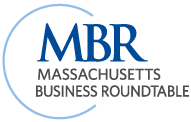Perspectives from the Annual Meeting of State Roundtables
Earlier this month, I joined with other leaders of State Roundtables from seventeen states across the country. MBR serves as the organizer of this national affiliation of business roundtables, hosted this year by the Florida Council of 100, providing a valuable forum of peers with shared experience to share best practices both on policy and organizational issues. This year we discussed shared policy issues such as workforce, housing and the economy, as well as state efforts to highlight and rebrand business contributions to their community, the future demands of energy in America, global supply chain trends, and the “role of the business sector in democracy,” exploring when and how employers engage on social issues.
Special thanks to the Florida Council of 100 for hosting this meeting, and for my colleagues from New York, Washington, Iowa, Oklahoma, Hawaii, Minnesota, Maryland, California, Michigan, Colorado, Oregon, Louisiana, Ohio, Arizona and the national Business Roundtable for their insights and wisdom. Each state has great opportunity and many similar challenges, and we learned a lot about Florida, where cutting edge innovation is happening at places like Lake Nona, where the conference took place.
Here are my five takeaways from this year’s meeting:
- On the economy, “we simply don’t know.” While there was general agreement that a potential recession will be short and have a quicker recovery, it remains difficult to predict. Mixed economic trends, combined with vast differences in how various sectors are performing, led one participant to say that the impact of the recession “depends on where you sit.” Jamie Dimon, the CEO of JP Morgan and immediate past chair of the Business Roundtable, summed it up when he said “we simply don’t know.”
- Like in Massachusetts, the top policy issues confronting other states are workforce and housing. It is notable that in past convenings of this group, while workforce has been a consistent priority, housing is relatively new. The impact of the pandemic on where and how people work has impacted mobility and where people choose to live. This impact is being felt across the country.
- Many state roundtables are struggling with increasing antagonism against corporate America and are more intentionally developing initiatives to actively rebrand their work and change the narrative. Some strategies include a public relations campaign designed to highlight positive contributions business makes to the community, intentionally developing relationships and partnerships on issues of shared interest, and civic engagement efforts that activate the employee base.
- Businesses and business associations have an “obligation” to speak out on social issues, even though doing so can be “dangerous.” The values of the company or organization will dictate how and when to engage on social issues, and communicating why a decision is being made to speak out or not, and having a clear policy for civic engagement, are essential. “Be brave and be prepared to lose” is how one participant described the risk involved.
- Federal issues of interest to the national Business Roundtable include the upcoming debt limit discussions, China, the expiration of the tax code in 2025, and addressing regulatory issues particularly at the SEC.
For more information on this meeting, its takeaways, and the State Business Roundtable Executives network, please contact JD Chesloff at jdchesloff@maroundtable.com.
RECENT POSTS
- No Borders: Climate Change, A Call to Action for All
- Celebrating Diversity
- A Talent Agenda to Drive Massachusetts Competitiveness
- Taking Aim at the State’s Competitiveness
- Bentley and Roundtable Gather Executives To Discuss How Business Impacts Society
- Quarterly Policy Roundup: Q2 2024
- What We Learned on Our Trip to D.C.
- Conversations with Business Leaders: Navigating the Challenges Impacting Growth in Massachusetts
- Quarterly Policy Roundup: Q1 2024
- Black History Month: Reflections from Roundtable Staff
